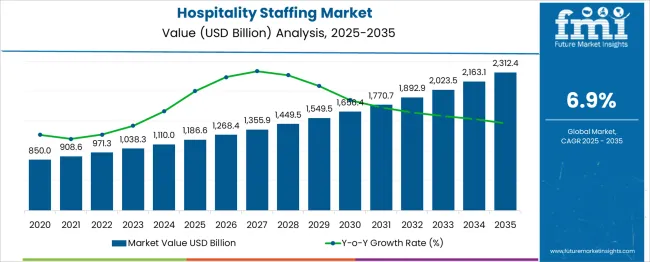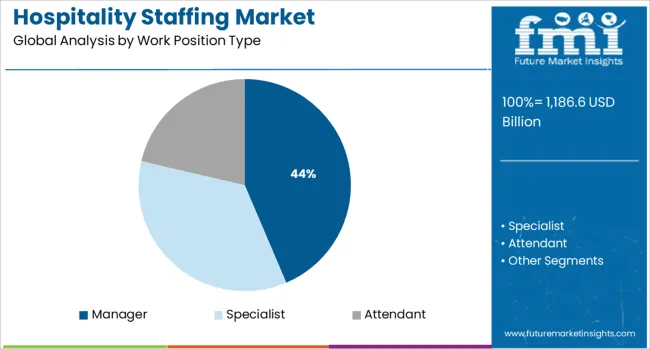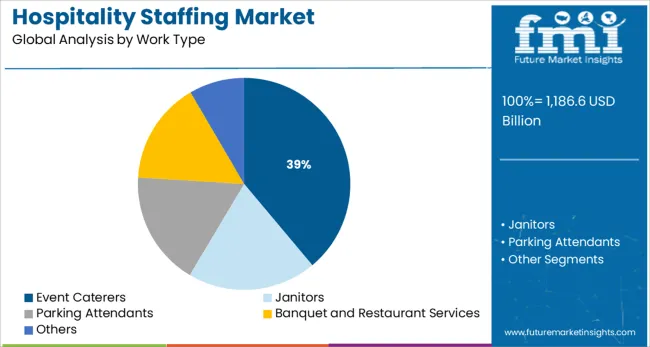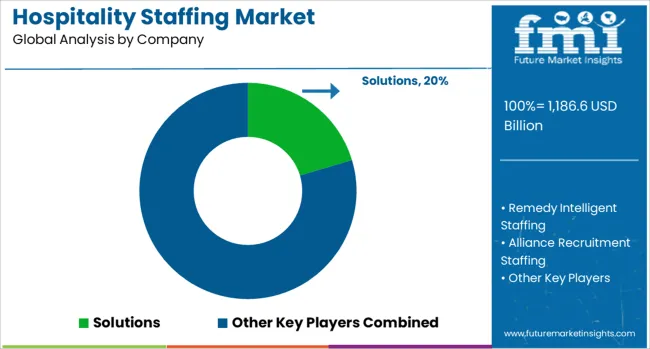The hospitality staffing market is valued at USD 1,186.6 billion in 2025 and is expected to reach USD 2,312.4 billion by 2035 at a CAGR of 6.9%. The manager position holds 43.6% share in 2025 as hotels, resorts, food service chains, and event venues depend heavily on supervisory, operational, and guest management functions. The event caterers category leads the work type segment with 38.9% share supported by rising on demand catering requirements, expansion of corporate events, and increased reliance on flexible staffing pools for weddings, conferences, and social gatherings.
Growth is supported by increased travel activity, reopening of hospitality establishments, and heightened reliance on staffing partners for seasonal, project based, and rapid replacement workforce needs. Platforms that streamline scheduling, performance tracking, onboarding, and skills based role assignment strengthen adoption across food service, lodging, and tourism enterprises. Although challenges such as variable labor availability, inconsistent service quality, and dependence on third party workforce management influence hiring strategies, staffing providers continue to expand digital hiring tools, skill verification systems, and managed workforce solutions that reinforce market expansion across global hospitality operations.

| Metric | Value |
|---|---|
| Hospitality Staffing Market Estimated Value in (2025 E) | USD 1186.6 billion |
| Hospitality Staffing Market Forecast Value in (2035 F) | USD 2312.4 billion |
| Forecast CAGR (2025 to 2035) | 6.9% |

The manager segment holds 43.6% share in 2025 due to growing reliance on experienced leadership across hotels, restaurants, resorts, and event facilities. Managers oversee operational continuity, guest satisfaction, vendor coordination, and staff supervision, which makes steady hiring essential as travel volumes rise. Demand strengthens as new hospitality projects increase, service standards improve, and establishments focus on structured oversight to maintain brand experience. Workforce platforms support the manager role through competency tracking, automated scheduling, and task assignment systems, contributing to sustained dominance of this segment.

The event caterers segment holds 38.9% share in 2025 driven by rising event centric business models and increased dependence on flexible, scalable staff pools. Catering operations require menu preparation teams, servers, coordinators, and logistics personnel for high volume event cycles, making outsourced staffing a preferred approach. Organizations use staffing platforms to manage event timelines, skill allocation, shift planning, and service readiness. Growth in corporate functions, destination weddings, and private gatherings reinforces strong demand for specialized event catering teams supported by structured staffing solutions.
Rising tourist activities in new countries followed by the new tourist places opening up with accommodation discounts and high capital investments are gaining the traction for the hospitality staffing market.
The government and its initiative have put forward the agenda of making the travel and hospitality industry survive and then get it back on track. In doing so, the government has invested a big amount of capital in the hospitality industry, making it possible for the sector to maintain staff.
As soon as the restriction and lockdown had been lifted, the hospitality centers started hiring new employees. Therefore the use of hospitality staffing solutions comes into the place, making it easier for management to hire new staff and make the business running. Restaurants have made it hard to hire employees as there is a decline in the inflow of customers as they order food online.
The major restrictions that hold the hospitality staffing market backwards are the use of third-party services along with the incompetency of the management that fails to hire the right set of staff that helps the business is growing exponentially.
This involves the roles and responsibilities attached to different positions that one needs to acquire. Though hospital staffing solutions help these hiring operations, the need for better operating skills is always required.
The hospitality staffing market analysis explains that the market is categorized by work position, work, and end user. These categories are further divided into small segments that expand their channels in multiple market spaces. These segments perform differently in multiple markets as they have a stronghold in multiple regions.
The work position category is segmented into Manager, Specialist, Attendant, Chef, Auditor, and Receptionist, while the work type category is divided into Event Caterers, Janitors, Parking Attendants, Banquet and Restaurant Servers. The last category as the end-user industry is segmented into Food and Beverages, Travel and Tourism, and Lodging.
By work position type, the manager segment is the largest segment and will hold the biggest sector of the market in the forecast period. The analysis shows that the manager segment is set to thrive at a CAGR of 4.3% in the forecast period, while previously, the segment was thriving at a slightly lower CAGR of 3.3%.
Hospitality staffing market analysis explains that the factors behind the growth of this segment are the lack of leadership vacuum, rising management issues, and new project-based companies setting up in the FMCG and travel industry. These factors flourish the demand for the hospitality staffing market along with the rise of this very segment.

The competitive landscape of hospitality staffing is dynamic in nature and allows new competitors to thrive in the market and increase competitiveness.
The companies in the market are a part of mergers and collaborations that result in increased distribution channels and market spaces. These companies focus on updating the solutions and making the platform more position-oriented.
Recent Developments in the Hospitality Staffing Market
The global hospitality staffing market is estimated to be valued at USD 1,186.6 billion in 2025.
The market size for the hospitality staffing market is projected to reach USD 2,312.4 billion by 2035.
The hospitality staffing market is expected to grow at a 6.9% CAGR between 2025 and 2035.
The key product types in hospitality staffing market are manager, specialist and attendant.
In terms of work type, event caterers segment to command 38.9% share in the hospitality staffing market in 2025.






Our Research Products

The "Full Research Suite" delivers actionable market intel, deep dives on markets or technologies, so clients act faster, cut risk, and unlock growth.

The Leaderboard benchmarks and ranks top vendors, classifying them as Established Leaders, Leading Challengers, or Disruptors & Challengers.

Locates where complements amplify value and substitutes erode it, forecasting net impact by horizon

We deliver granular, decision-grade intel: market sizing, 5-year forecasts, pricing, adoption, usage, revenue, and operational KPIs—plus competitor tracking, regulation, and value chains—across 60 countries broadly.

Spot the shifts before they hit your P&L. We track inflection points, adoption curves, pricing moves, and ecosystem plays to show where demand is heading, why it is changing, and what to do next across high-growth markets and disruptive tech

Real-time reads of user behavior. We track shifting priorities, perceptions of today’s and next-gen services, and provider experience, then pace how fast tech moves from trial to adoption, blending buyer, consumer, and channel inputs with social signals (#WhySwitch, #UX).

Partner with our analyst team to build a custom report designed around your business priorities. From analysing market trends to assessing competitors or crafting bespoke datasets, we tailor insights to your needs.
Supplier Intelligence
Discovery & Profiling
Capacity & Footprint
Performance & Risk
Compliance & Governance
Commercial Readiness
Who Supplies Whom
Scorecards & Shortlists
Playbooks & Docs
Category Intelligence
Definition & Scope
Demand & Use Cases
Cost Drivers
Market Structure
Supply Chain Map
Trade & Policy
Operating Norms
Deliverables
Buyer Intelligence
Account Basics
Spend & Scope
Procurement Model
Vendor Requirements
Terms & Policies
Entry Strategy
Pain Points & Triggers
Outputs
Pricing Analysis
Benchmarks
Trends
Should-Cost
Indexation
Landed Cost
Commercial Terms
Deliverables
Brand Analysis
Positioning & Value Prop
Share & Presence
Customer Evidence
Go-to-Market
Digital & Reputation
Compliance & Trust
KPIs & Gaps
Outputs
Full Research Suite comprises of:
Market outlook & trends analysis
Interviews & case studies
Strategic recommendations
Vendor profiles & capabilities analysis
5-year forecasts
8 regions and 60+ country-level data splits
Market segment data splits
12 months of continuous data updates
DELIVERED AS:
PDF EXCEL ONLINE
Hospitality Mattress Market Size and Share Forecast Outlook 2025 to 2035
Staffing Software Market Growth – Trends & Forecast through 2034
AI-Driven BFSI Staffing – Optimizing Hiring & Workforce Growth
Smart Hospitality & Coworking Spaces Market Trends - Growth & Forecast 2025 to 2035
Smart Hospitality Management Market
Overflow Staffing Services Market Size and Share Forecast Outlook 2025 to 2035
Contingent Staffing Solutions Market Size and Share Forecast Outlook 2025 to 2035
Talent Acquisition and Staffing Technology and Service Market Analysis – Size, Share, and Forecast Outlook 2025 to 2035

Thank you!
You will receive an email from our Business Development Manager. Please be sure to check your SPAM/JUNK folder too.
Chat With
MaRIA